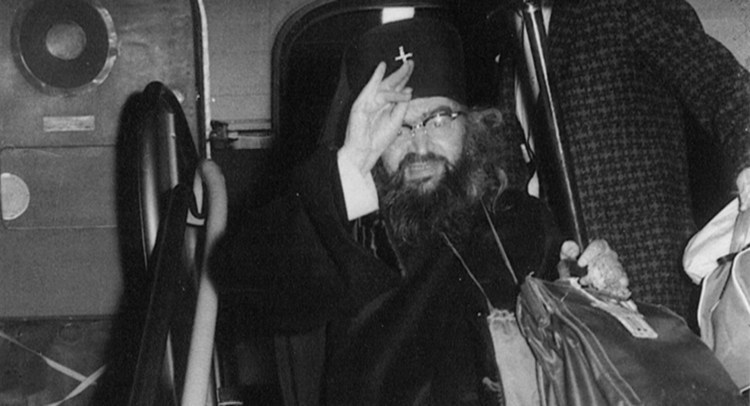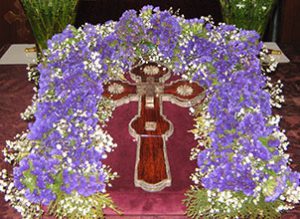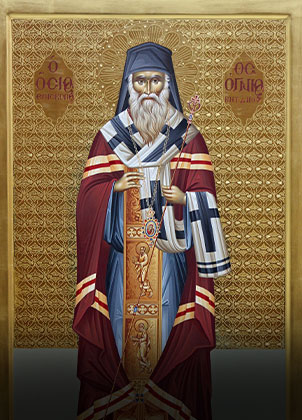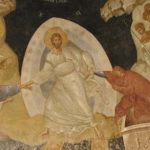Слово о Поминовении Усопших.
Св. Иоанн Шанхайский и Сан-Францисский
Неутешна и безгранична должна бы была быть наша скорбь об умирающих наших близких, если бы не даровал нам Господь жизнь вечную. Безсмысленна была бы наша жизнь, если бы кончалась со смертью. Какая польза тогда от добродетели, от добрых дел? Правы тогда говорящие «станем есть и пить, ибо завтра умрем!» Но создан человек для безсмертия, а Своим Воскресением Христос разверз врата Небесного Царства, вечного блаженства, в Него веровавшим и праведно жившим. Земная наша жизнь — подготовление к будущей, и смертью нашей заканчивается та подготовка. «Человеку надлежит однажды умереть, потом же суд» (Евр. 9.27).

Оставляет тогда человек все свои земные попечения, распадается тело, чтобы вновь восстать в общее воскресение. Но душа его продолжает жить и ни на миг не прекращает своего существования. Многими явлениями умерших дано нам отчасти знать, что происходит с душой, когда она выходит из тела. Когда прекращается ее зрение телесными очами, тогда открывается ее духовное зрение. Часто оно начинается у умирающих еще до кончины и они, еще видя окружающих и даже разговаривая с ними, видят то, что другие не видят.
Выйдя же из тела, душа оказывается среди других духов, добрых и злых. Обычно она стремится к тем, которые более сродны по духу, а если, находясь в теле, она была под влиянием некоторых, то остается в зависимости от них выйдя из тела, как бы неприятны они ни оказались при встрече.
В течение двух дней душа пользуется относительной свободой, может посещать места на земле ею любимые, а на третий день направляется в иные пространства. При том она проходит через полчища злых духов, преграждающих ей путь и обвиняющих ее в различных грехах, на которые они сами ее соблазняли. Согласно откровениям, имеется двадцать таких преград, т.н. мытарств, на каждом из них испытуется тот или иной вид греха; пройдя через одно, душа попадает на следующее, и лишь благополучно пройдя через все, душа может продолжать свой путь, а не быть сразу ввержена в геену. Насколько ужасны те бесы и их мытарства показывает то, что Сама Богородица, извещенная архангелом Гавриилом о предстоящей кончине, молила Сына Своего Избавить Ее от тех бесов и, исполняя Ее молитву Сам Господь Иисус Христос явился с Неба принять душу Своей Пречистой Матери и вознести на небо. Страшен бывает третий день для души усопшего и посему особенно нуждается она тогда в молитве о ней.
Благополучно пройдя мытарства и поклонившись Богу душа в течение еще тридцати семи дней посещает селения небесные и пропасти адские, не зная еще где она окажется, и лишь на сороковой день определяется ее место до Воскресения мертвых. Одни души находятся в состоянии предвкушения вечной радости и блаженства, а другие — в страхе вечных мучений, которые полностью наступят после Страшного Суда. До тех пор возможны еще перемены в состоянии душ, особенно через приношение за них Безкровной Жертвы (поминовение на литургии), а также и по другим молитвам.
Насколько важно при том поминовение за литургией, показывает следующее событие. Перед открытием мощей св. Феодосия Черниговского (1896 г.), совершавший переоблачение мощей священник, уморившись, сидя возле мощей, задремал и увидел перед собой святителя, сказавшего ему: «Благодарю тебя, что для меня потрудился. Еще прошу тебя, когда будешь совершать литургию, помяни моих родителей» — и назвал их имена (иерея Никиту и Марии). «Как ты, святитель, просишь у меня молитв, когда сам стоишь у престола небесного и подаешь людям милости Божии» — спросил священник. «Да, это верно, — ответил св. Феодосий, — но приношение за литургией сильнее моей молитвы».
Посему полезны усопшим и панихиды и домашние молитвы о усопших, и добрые дела, творимые в их память, как например, милостыня, жертвы на церковь, но особенно полезно для них поминовение за Божественной литургией. Много было явлений усопших и других событий, подтверждающих, насколько благодетельно поминовение усопших. Многие умершие с покаянием, но не успевшие то проявить при жизни, освобождались от мук и получали упокоение. В церкви всегда возносятся молитвы о упокоении усопших и даже в день сошествия Святого Духа в колено преклоненных молитвах, на вечерне есть особое моление «о еже в аде держимых».
Каждый же из нас, желая проявить свою любовь к усопшим и оказать им действительную помощь, лучше всего это может сделать через молитву о них, в особенности поминовением их на литургии, когда вынимаемые за живых и усопших частицы опускаются в кровь Господню со словами «Отмый Господи грехи поминавшихся зде Кровию Твоею честною, молитвами святых Твоих». Ничего лучшего и большего не можем мы сделать для усопших, как молиться о них, подавая за них поминовение на литургии. В том они нуждаются всегда, а особенно в те сорок дней, в которые душа усопшего проходит свой путь до вечных обителей. Не чувствует ничего тогда тело, не видит собравшихся близких, не обоняет благоухания цветов, не слышит надгробных речей. Но ощущает душа возносимые о ней молитвы, благодарна бывает тем, кто их творит и духовно бывает близка им.
Родные и близкие усопших! Делайте для них то, что им нужно и что в ваших силах. Тратьте средства не на внешние украшения гроба и могилы, а на помощь нуждающимся, в память усопших близких, на церкви, где возносятся о них молитвы. Окажите милость усопшему, позаботьтесь о душе его. Всем нам предстоит тот путь; как будем тогда желать, чтобы молитвенно помянули нас! Будем же и сами милостивы к усопшим. Как только кто преставится, немедленно зовите или извещайте священника прочитать «последование по исходе души», которое положено читать над всеми православными сразу по их кончине. Постарайтесь, чтобы, если есть возможность, отпевание происходило в церкви и до отпевания над покойником читалась Псалтирь. Отпевание может совершаться и не пышно, но обязательно полностью, без сокращения; думайте тогда не о себе и своих удобствах, а об усопшем, с которым прощаетесь навеки. Если одновременно в церкви несколько покойников, не отказывайтесь от того, чтобы их отпевали совместно. Лучше пусть отпевают сразу двух или больше покойников и еще горячее будет молитва собравшихся всех их близких, чем будут отпевать их по очереди и, не имея сил и времени, будут сокращать службу, когда каждое слово молитвы для усопшего есть как капля воды жаждущему. Обязательно позаботьтесь сразу о совершении сорокоуста, т.е. ежедневном поминовении в течение 40 дней на литургии. Обычно в церквах, где происходит ежедневное священнослужение, отпетые там усопшие поминаются в течение сорока дней и больше. Если же отпевают церкви, где нет ежедневной службы, близкие должны сами позаботиться и заказать сорокоуст там, где ежедневная служба. Хорошо посылать также на поминовение в монастыри и в Иерусалим, где постоянная молитва у святых мест. Но нужно сорокоуст начинать сразу после кончины, когда душа особенно нуждается в молитвенной помощи и посему начать поминовение в ближайшем месте, где ежедневная служба.
Будем заботиться о уходящих в иной мip прежде нас, дабы для них сделать все, что можем, помня, что «Блажени милостивии, яко тии помиловани будут».
(Отрывок из книги «Слова иже во святых отца нашего Иоанна Архиепископа Шанхайского и Сан-Францисского»)
Homily on Commemoration of the Dead
by St John of Shanghai and San Francisco.
Limitless and without consolation would have been our sorrow for close ones who are dying, if the Lord had not given us eternal life. Our life would be pointless if it ended with death. What benefit would there then be from virtue and good deed? Then they would be correct who say: “Let us eat and drink, for tomorrow we die!” But man was created for immortality, and by His resurrection Christ opened the gates of the Heavenly Kingdom, of eternal blessedness for those who have believed in Him and have lived righteously. Our earthly life is a preparation for the future life, and this preparation ends with our death. “It is appointed unto man once to die, but after this the judgment” (Heb 9:27). Then a man leaves all his earthly cares; the body disintegrates, in order to rise anew at the General Resurrection. Often this spiritual vision begins in the dying even before death, and while still seeing those around them and even speaking with them, they see what others do not see.
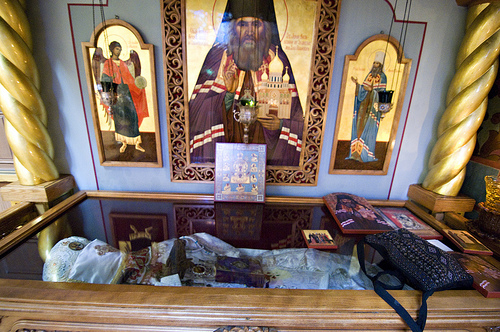
But when it leaves the body, the soul finds itself among other spirits, good and bad. Usually it inclines toward those which are more akin to it in spirit, and if while in the body it was under the influence of certain ones, it will remain in dependence upon them when it leaves the body, however unpleasant they may turn out to be upon encountering them.
For the course of two days the soul enjoys relative freedom and can visit places on earth which were dear to it, but on the third day it moves into other spheres. At this time (the third day), it passes through legions of evil spirits which obstruct its path and accuse it of various sins, to which they themselves had tempted it. According to various revelations there are twenty such obstacles, the so-called “toll-houses,” at each of which one or another form of sin is tested; after passing through one the soul comes upon the next one, and only after successfully passing through all of them can the soul continue its path without being immediately cast into Gehenna. How terrible these demons and their toll-houses are may be seen in the fact that Mother of God Herself, when informed by the Archangel Gabriel of Her approaching death, begged Her Son to deliver Her soul from these demons and, answering Her prayer, the Lord Jesus Christ Himself appeared from heaven to receive the soul of His Most Pure Mother and conduct it to heaven. Terrible indeed is the third day for the soul of the departed, and for this reason it especially needs prayers then for itself.
Then, having successfully passed through the toll-houses and bowed down before God, the soul for the course of 37 more days visits the heavenly habitations and the abysses of hell, not knowing yet where it will remain, and only on the fortieth day is its place appointed until the resurrection of the dead. Some souls find themselves (after the forty days) in a condition of foretasting eternal joy and blessedness, and others in fear of the eternal torments which will come in full after the Last Judgment. Until then changes are possible in the condition of souls, especially through offering for them the Bloodless Sacrifice (commemoration at the Liturgy), and likewise by other prayers.
How important commemoration at the Liturgy is may be seen in the following occurrence: Before the uncovering of the relics of St. Theodosius of Chernigov (1896), the priest-monk (the renowned Starets Alexis of Goloseyevsky Hermitage, of the Kiev-Caves Lavra, who died in 1916) who was conducting the re-vesting of the relics, becoming weary while sitting by the relics, dozed off and saw before him the Saint, who told him: “I thank you for labouring with me. I beg you also, when you will serve the Liturgy, to commemorate my parents” — and he gave their names (Priest Nikita and Maria). “How can you, O Saint, ask my prayers, when you yourself stand at the heavenly Throne and grant to people God’s mercy?” the priest-monk asked. “Yes, that is true,” replied St. Theodosius, “but the offering at the Liturgy is more powerful than my prayer.”
Therefore, panikhidas and prayer at home for the dead are beneficial to them, as are good deeds done in their memory, such as alms or contributions to the church. But especially beneficial for them is commemoration at the Divine Liturgy. There have been many appearances of the dead and other occurrences which confirm how beneficial is the commemoration of the dead. Many who died in repentance, but who were unable to manifest this while they were alive, have been freed from tortures and have obtained repose. In the Church prayers are ever offered for the repose of the dead, and on the day of the Descent of the Holy Spirit, in the kneeling prayers at vespers, there is even a special petition “for those in hell.”
Every one of us who desires to manifest his love for the dead and give them real help, can do this best of all through prayer for them, and particularly by commemorating them at the Liturgy, when the particles which are cut out for the living and the dead are let fall into the Blood of the Lord with the words: “Wash away, O Lord, the sins of those here commemorated by Thy Precious Blood and by the prayers of Thy saints.” We can do nothing better or greater for the dead than to pray for them, offering commemoration for them at the Liturgy. Of this they are always in need, and especially during those forty days when the soul of the deceased is proceeding on its path to the eternal habitations. The body feels nothing then: it does not see its close ones who have assembled, does not smell the fragrance of the flowers, does not hear the funeral orations. But the soul senses the prayers offered for it and is grateful to those who make them and is spiritually close to them.
O relatives and close ones of the dead! Do for them what is needful for them and within your power. Use your money not for outward adornment of the coffin and grave, but in order to help those in need, in memory of your close ones who have died, for churches, where prayers for them are offered. Show mercy to the dead, take care of their souls. Before us all stands the same path, and how we shall then wish that we would be remembered in prayer! Let us therefore be ourselves merciful to the dead. As soon as someone has reposed, immediately call or inform a priest, so he can read the Prayers appointed to be read over all Orthodox Christians after death. Try, if it be possible, to have the funeral in Church and to have the Psalter read over the deceased until the funeral. Most definitely arrange at once for the serving of the forty-day memorial, that is, daily commemoration at the Liturgy for the course of forty days. It is likewise good to send contributions for commemoration to monasteries, as well as to Jerusalem, where there is constant prayer at the holy places.
Let us take care for those who have departed into the other world before us, in order to do for them all that we can, remembering that “Blessed are the merciful, for they shall obtain mercy.”
(From the book “Sermons of St John of Shanghai and San Francisco”).

